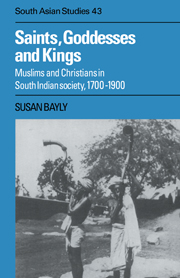Book contents
- Frontmatter
- Contents
- List of plates
- List of maps
- Preface
- Note on transliteration
- List of abbreviations
- Introduction
- Part I
- Part II
- 7 South Indian Christians in the pre-colonial period
- 8 The collapse of Syrian Christian ‘integration’
- 9 The Christian Paravas of southern Tamilnad
- 10 Christian saints and gurus in the poligar country
- 11 Christianity and colonial rule in the Tamil hinterland
- 12 Conclusion
- Select glossary
- Bibliography
- Index
- CAMBRIDGE SOUTH ASIAN STUDIES
- Plate section
7 - South Indian Christians in the pre-colonial period
from Part II
Published online by Cambridge University Press: 04 December 2009
- Frontmatter
- Contents
- List of plates
- List of maps
- Preface
- Note on transliteration
- List of abbreviations
- Introduction
- Part I
- Part II
- 7 South Indian Christians in the pre-colonial period
- 8 The collapse of Syrian Christian ‘integration’
- 9 The Christian Paravas of southern Tamilnad
- 10 Christian saints and gurus in the poligar country
- 11 Christianity and colonial rule in the Tamil hinterland
- 12 Conclusion
- Select glossary
- Bibliography
- Index
- CAMBRIDGE SOUTH ASIAN STUDIES
- Plate section
Summary
Introduction
The next four chapters will focus on south India's large and varied Christian populations, beginning with the elite Malayalam-speaking St Thomas Christians of the Malabar coast (now the state of Kerala). As for the region's Muslim groups, the questions to be asked here are, first, how did the various Christian populations come to be established in the south; second, what was their relationship to the culture and society which surrounded them, and third, how were they affected by economic change and by shifts in state power in the pre-colonial and colonial periods?
European missionaries have always tended to be tireless diarists and record keepers. The most distinguished of them – early Jesuits such as Robert de Nobili, nineteenth-century scholar-missionaries like Robert Caldwell, G.U. Pope and the Abbé Dubois – were pioneering ethnographers, linguists and regional historians, and their writings are still an important source of first-hand observation and analysis. Since the Roman Catholic church was an essential arm of state power in the Estado da India, that is in the regions of Asia over which Portugal claimed ecclesiastical and imperial authority in the sixteenth and early seventeenth centuries, there is much Portuguese documentation of south India's early Catholic convert groups. The British sources too take a disproportionate interest in south Indian Christians. Although (with one or two exceptions) missionaries had no official standing under British rule, members of the major Protestant missionary organisations took it upon themselves to document the supposed ‘abuses’ and ‘corruptions’ of ‘native heathen’ society, bombarding government officials and home-based evangelical journals with demands for state intervention on behalf of their converts, and arousing energetic debates about the potential merits and dangers of missionary-sponsored proselytising campaigns.
- Type
- Chapter
- Information
- Saints, Goddesses and KingsMuslims and Christians in South Indian Society, 1700–1900, pp. 241 - 280Publisher: Cambridge University PressPrint publication year: 1990



